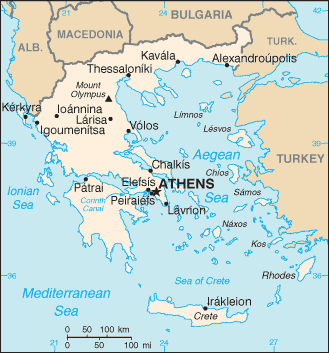The Hellenic Center for Disease Control & Prevention (KEELPNO) reported a human West Nile virus (WNV) case in an individual who lives in an agricultural area in Argolida, Peloponnese.

Image/CIA
This is the first human WNV case in Greece in two years.
Health officials advise people living and visiting Greece should take precautions to avoid being bitten by mosquitoes throughout the country as they can not predict where the next case might occur.
West Nile virus is a mosquito-borne disease that can cause encephalitis, a brain inflammation. Human WNV disease has been reported in Greece since 2010.
According to the US Centers for Disease Control and Prevention (CDC), approximately 80 percent of people (about 4 out of 5) who are infected with WNV will not show any symptoms at all.
Game of Thrones tours in Europe
Up to 20 percent of the people who become infected have symptoms such as fever, headache, and body aches, nausea, vomiting, and sometimes swollen lymph glands or a skin rash on the chest, stomach and back. Symptoms can last for as short as a few days, though even healthy people have become sick for several weeks.
About one in 150 people infected with WNV will develop severe illness. The severe symptoms can include high fever, headache, neck stiffness, stupor, disorientation, coma, tremors, convulsions, muscle weakness, vision loss, numbness and paralysis. These symptoms may last several weeks, and neurological effects may be permanent.
There is no specific treatment for WNV infection. For more infectious disease news and information, visit and “like” the Infectious Disease News Facebook page
Related:
- Greece reports locally acquired malaria, blood donations banned in certain areas
- Greece reports first MERS coronavirus case
- Europe Vector Maps: Invasive Ticks, Mosquitoes & Sand Flies
- Kenya cholera update: Over 1200 cases reported
- Crypto infections linked to raw milk in South Australia
- Iowa: Ida County man is state’s 1st West Nile virus case
- Dengue in Hanoi, Vietnam: 1100 cases reported last week
- Legionnaires’ disease linked to Graceland: 9 confirmed cases, Aquatics facilities reopen


